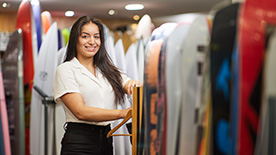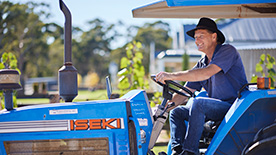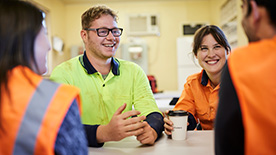Lucinda's recovery and return to work story
Video transcript
DESCRIPTION:
On an indoor basketball court, a woman uses a wheelchair. She has dark brown hair and wears a black and orange polo shirt.
TEXT: Lucinda Bueti – Australian Wheelchair Basketballer
LUCINDA BUETI:
Hi, my name is Lucinda. I had a workplace injury in 2015. This is my story from the day that I was injured to today, where I play wheelchair basketball for Australia.
DESCRIPTION:
A large warehouse has tall shelves lined with pallets and various products.
LUCINDA BUETI:
I was stacking shelves like I normally do and I went to go put something up on the shelf. And as I put it up, my knee hit into the corner of the shelf and the shelf fell into my knee and I was on the floor in a lot of pain.
DESCRIPTION:
Large boxes are stacked high on tall warehouse shelves.
A person rubs their leg as they limp across the warehouse floor.
An open laptop computer sits on a dark timber desk alongside a clipboard and pen and a small open cardboard box.
LUCINDA BUETI:
I had to finish off my shift 'cause I was night fill manager at the time. And the next day I woke up with a lot of pain still in my knee.
DESCRIPTION:
A person uses crutches to move slowly across a polished timber floor.
LUCINDA BUETI:
I was struggling to walk and I remember going to my GP saying to her like, there's something wrong. I'm in a lot of pain. My knee is supposed to be more than 90% and I can't get it passed past 20 degrees and just never did get there.
DESCRIPTION:
In a still colour image, Lucinda stands at the end of a hospital bed.
LUCINDA BUETI:
And then yeah, we got to a point where it was like the best thing for you is gonna be to amputate. I amputated and then all of a sudden, after six odd years of nothing working. The progress I had in that 12 months after having my amputation was so much more than what it was before.
DESCRIPTION:
In a grainy home video, Lucinda walks down a hospital corridor.
LUCINDA BUETI:
I was doing weights, I was walking. There was a lot of things. It was just the progression of it is just yeah, incredible.
DESCRIPTION:
Outside, near a green square-panelled building, a blonde woman stands alongside a car. She has shoulder-length blonde hair and wears glasses and a navy-blue vest over a black shirt.
TEXT: Emma Lindsay – Return to Independence Specialist Gallagher Bassett
EMMA LINDSAY:
My role in supporting Lucinda has mostly been helping her access the treatment that she needs and also the specialised equipment.
DESCRIPTION:
Linda sits outside at a small table with Lucinda. A sign on the window reads ‘Ground Floor Cafe’ and they each have coffees. Linda has an open laptop computer in front of her.
EMMA LINDSAY:
I just really remember from that first meeting that she just wasn't gonna let her injury stand in the way of achieving her goals. She was really had a positive mindset and just had big dreams. And I just had a feeling in that meeting that she was gonna go on to achieve really amazing things.
DESCRIPTION:
Lucinda stands outside on a large stretch of grass with Linda.
LUCINDA BUETI:
My current claims manager Emma has been really supportive. I think her background as well has helped in that. She has a lot more of an understanding of the chronic pain that I was in. But also now with the amputation, what sort of things I need and knowing the right services to send me to.
DESCRIPTION:
In a park, Linda walks along a footpath with Lucinda. Lucinda has a black prothesis where her left leg was amputated.
LUCINDA BUETI:
She was there to support me as a case manager, but she was also very supportive in a human side as well.
EMMA LINDSAY:
The types of support services available to Lucinda were helping her find employment. She was referred to a service called Beneficent. Which is an employment service for seriously injured people. And that helped her to access new employment. And actually within a few weeks of me meeting Lucinda, she had independently gained her own employment.
DESCRIPTION:
Lucinda interviewed on the basketball court.
LUCINDA BUETI:
When you're at home injured, you don't have a plan for your day, going back out into it gave me that structure that I was missing.
DESCRIPTION:
Lucinda practices wheelchair basketball on a large indoor court with other wheelchair athletes.
LUCINDA BUETI:
And I got into wheelchair basketball and it just changed everything. It was a community of people that I hadn't met before. I thought I knew about disability, but I really didn't know anything about disability until I started playing wheelchair basketball.
EMMA LINDSAY:
I helped Lucinda access the wheelchair and physio services to support her goal of playing wheelchair basketball. And she wanted to go on to play at an elite level. So we were able to help her link in with a physio that could help her build her body to be a bit more robust. Because wheelchair basketball is a very physical sport and we were also able to help her access a specialised wheelchair.
DESCRIPTION:
Linda stands with Lucinda at the back of a white SUV. Lucinda sits in her wheelchair and adjusts some straps on her right leg.
EMMA LINDSAY:
She had been using a loan wheelchair that wasn't quite fitting her well. So we were able to get her a custom chair that would allow her to play more safely.
LUCINDA BUETI:
So I went out, started playing on Tuesday nights here at The Lights, and then from there started in the development squad for the state team.
DESCRIPTION:
In a still colour image, Lucinda and other wheelchair athletes at the side of a basketball court.
Grainy video footage of Lucinda playing wheelchair basketball.
LUCINDA BUETI:
Somehow one of the national coaches saw a video of me playing. And I got asked to go to Queensland and play a competition called Queensland Classics. Where I got to train with the Gliders squad, who's the national team.
DESCRIPTION:
In a still colour image, the Australian women’s wheelchair basketball team pose for a team photograph on a basketball court. They all wear yellow ‘green and gold’ Australia singlets.
LUCINDA BUETI:
And yeah, since then I've been part of the Gliders squad, so I play for Australia. We train 10 to 15 hours a week, which is a lot of training. But in February this year, I was lucky enough to be selected to the squad going to go play against Japan in the Osaka Cup.
DESCRIPTION:
In a still colour image, Lucinda and another dark-haired woman in a wheelchair pose for a photograph. They hold a green and gold Australia singlet between them.
A second image of Lucinda competing in the game against Japan.
LUCINDA BUETI:
Which was an incredible experience and I've now got the opportunity to travel the world playing wheelchair basketball with Australia.
EMMA LINDSAY:
My advice to others who might be in a similar situation to Lucinda would be to accept the help that's offered to you. Take the supports that are available and just maintain a positive attitude because with that you can achieve anything.
LUCINDA BUETI:
Going back into work has provided me with more structure. It's something that was really important to me before my injury. Getting back out and playing basketball, playing sport, something that I really enjoy doing. Made it a lot easier for me moving forwards because it was something to look forward to.
DESCRIPTION:
Lucinda trains with her wheelchair basketball team.
Lucinda shoots a basket.
LUCINDA BUETI:
I've got another group of people who I can talk to. But who also understand what it's like because they themselves have experienced it. So definitely getting out there and finding other people to talk to is a big thing.
DESCRIPTION:
A still colour image of Lucinda smiling on the basketball court.
(END OF RECORDING)





 Date printed: 17 Apr 2025
Date printed: 17 Apr 2025

